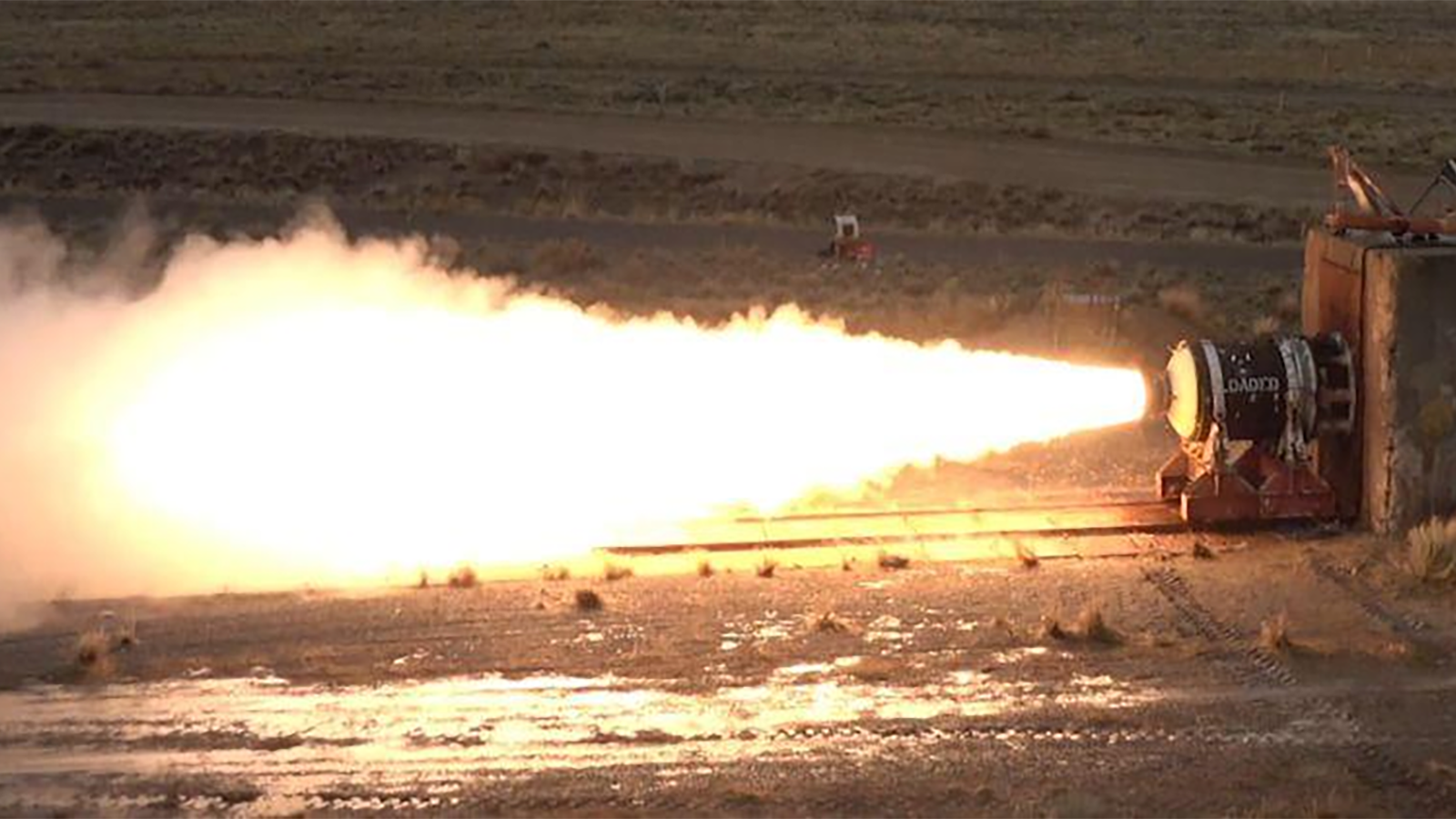
Aerojet Rocketdyne’s successful test of its Missile Components Advanced Technologies Demonstration Motor on May 12, 2020. (Aerojet)
Editor’s note: This report was modified at 5/25/22 at 10:35 am EST to clarify a description of the ongoing case.
WASHINGTON: The corporate war between two factions of Aerojet Rocketdyne board members is heating up in court this week, as the company’s chief executive and executive chairman fight for control of the only remaining independent maker of solid rocket motor engines.
On Monday, the Delaware Chancery Court began hearing a civil case brought forth by Warren Lichtenstein, Aerojet’s executive chairman whose affiliates and Steel Partners Holdings LP hold 5.5% of the company’s shares. Lichtenstein alleges that Aerojet CEO Eileen Drake and her associates misused corporate resources to disparage him and attempt to gain control of the company.
Drake, a former Army helicopter pilot who has been the company’s chief executive since 2015, has alleged that Lichtenstein attempted to undermine a planned $4.4 billion merger with Lockheed Martin, which the Federal Trade Commission thwarted earlier this year, and seeks control of the company.
The court will decide whether Drake and her allies acted inappropriately over the course of the proxy war, which began in February shortly after the FTC sued to block the Lockheed merger. Until a judgement is delivered, its unclear how the trial will actually affect Aerojet’s corporate future, but if board members are ordered by the court to recuse themselves, it could tilt the balance in favor of either Drake or Lichtenstein’s allies.
On Monday, lawyers representing Lichtenstein and Drake’s factions questioned current Aerojet board members Kevin Chilton, Thomas Corcoran, James Henderson and Audrey McNiff about their activities during the proxy war and the relationship between Lichtenstein and Drake, according to a transcript of the court proceedings. Chilton and Corcoran are members of Drake’s director slate, while Henderson and McNiff are members of Lichtenstein’s slate.
In a statement released Monday, Lichtenstein said that Drake and her allies “misappropriated and unlawfully used corporate resources” and violated a temporary restraining order ordered by the Delaware Chancery Court in February, which effectively barred any of the current Aerojet board members from being able to speak on behalf of the board unless a majority of members approved.
“Shareholders will finally be able to learn material details about these misdeeds and see the desperate measures Ms. Drake has used in her attempt to gain control of the Company,” Lichtenstein said in the statement.
Drake has not made a public statement about the ongoing court proceedings. A request for comment by Breaking Defense was not returned by press time.
Currently, the Aerojet Rocketdyne board is deadlocked, with its eight members divided between Drake and Lichtenstein. Each group has proposed its own slate of directors, with Lichtenstein announcing on May 18 his intent to replace Drake with Mark Tucker, who served as Aerojet’s chief operating officer from 2015 to 2020.
That means the most important battle for the future of Aerojet Rocketdyne could occur outside of the courtroom, as Drake and Lichtenstein fight for the favor of Aerojet shareholders who will ultimately decide the fate of the company.
Drake hopes to rally shareholders to agree to special meeting for June 21, which would allow stockholders to end the proxy war by electing either the Drake or Lichtenstein-led slates.
In contrast, Lichtenstein has pushed for the company’s annual meeting to take place in mid-July, which he stated will allow shareholders to make “fully informed decisions” based on information revealed during the court proceedings.
It’s too early to tell whether the court proceedings will impact the shareholder vote, said Seth Seifman, an aerospace and defense analyst at J.P. Morgan.
“In terms of their vision for Aerojet, it’s not clear what the difference is between the two sides,” he said. However, if either side can provide evidence that one party is better fit to lead the company, “perhaps there’s some kind of opportunity … to influence shareholders one way or another.”
Competing Visions Of The Company
Although its annual revenues pale in comparison to major primes like Lockheed and Raytheon, Aerojet has an outsize importance in the defense industry as the sole independent supplier of solid rocket motors and other technologies needed for missiles, rockets and hypersonic weapons. Orbital ATK — Aerojet’s primary competitor in the solid rocket motor market — was acquired by Northrop Grumman in 2018.
A major concern that led to the FTC filing suit to prevent Lockheed’s acquisition of Aerojet was the prospect of reduced competition, as other defense primes could be forced to partner with a direct competitor in order to source components for key weapon systems.
However, supporters of the Lockheed merger have argued that without a major corporate parent, Aerojet could be vulnerable to market headwinds that can be more easily absorbed by the former Orbital, a competitor now rebranded as a subsection of Northrop.

Aerojet’s advanced manufacturing facility in Huntsville, Ala. (Aerojet Rocketdyne)
So now, the big question for shareholders is: What does the future look like for Aerojet once the proxy battle is resolved?
“Investors have been more focused on the fundamentals of the business, the strategic opportunities and the capital deployment” rather than the conflict between Drake and Lichtenstein, Seifman said.
In the hopes of enticing shareholders into voting for its favored director slate, each faction has created a website detailing its vision for the future of the company. For Lichtenstein’s slate, that vision includes assessing whether there are other buyers who could seek to acquire Aerojet.
“Our slate would take steps to ensure the Company is properly shopped. If and when a deal were to be reached, we would also take steps to secure a break fee and other terms to protect shareholders’ interests,” states SaveAerojet.com, a website run by Lichtenstein and his allies. Under Lichtenstein’s slate, the board will also explore “returning up to $400 million in cash to shareholders via share and convertible debt repurchases.”
Meanwhile, the website created by Drake and her cohort — MaximizeAJRValue.com — spotlights the national security bonafides of their proposed director slate, which would add former Air Force Secretary Deborah Lee James; former Rolls-Royce North America CEO Marion Blakely; Charles Bolden, a former NASA administrator and retired Marine Corps major general; and Gail Baker, who formerly led Collins Aerospace’s aftermarket business.
At this point, there’s little to differentiate Drake and Lichtenstein’s talking points, Seifman said. Both boards seem open to a future sale of the company, and “there’s not a very clear distinction thus far between what the two sides are offering” in terms of cash deployment.
Lichtenstein’s choice of Tucker to lead the company also suggests that the two factions could have a similar approach to running Aerojet.
“They’re probably not looking to make a major break in terms of strategy and operations of the company by suggesting someone who served under Eileen [Drake] for five years,” Seifman said.
Tucker, in a May 18 statement, said he had no desire to comment on the proxy contest and the relationship between Drake and Lichtenstein.
“The Company needs a functioning Board of Directors, a stable management team and a more confident employee base that has clear direction for carrying out planning, production and delivery of orders,” he said. “I am fully prepared to put in place the pillars of stability and long-term value creation.”
An ‘Ongoing Erosion of Trust’
The courtroom drama begins just a week after Aerojet announced that it had formally reprimanded Lichtenstein for comments made to third-parties about the then-ongoing merger with Lockheed Martin, as well as attempts to seek out a replacement to Drake without the approval of the board.
“Mr. Lichtenstein acted improperly in taking those actions,” the independent “Non-Management Committee of the Board of Directors” wrote in a memo dated May 2 and released last week. Aerojet had formed the committee in October to investigate Lichtenstein.
However, the committee added that Lichtenstein’s repeated demands for information from Drake in the months before and after the merger agreement was signed “did not constitute harassment or retaliation and was not improper” under Aerojet’s code of conduct or US law.

Aerojet Rocketdyne’s RS-68A rocket engine successfully completed its final acceptance test April 12, 2021, on the B-1 test stand at NASA’s Stennis Space Center in Mississippi. The RS-68A powers the United Launch Alliance Delta IV Heavy rocket to send critical spacecraft into orbit. (NASA)
A series of memorandums included as part of the investigation’s findings lays out a series of tensions between Drake and Lichtenstein.
In a May 10, 2021 memo to Arjun Kampani, who was then the company’s general counsel, Drake details an “ongoing erosion of trust” between her and Lichtenstein, stating that she had grown concerned that he would seek to thwart the Lockheed merger, take control of the company and reinstate new leadership at Aerojet.
“I can only assume Warren is thinking through next steps, in the event the LM transaction doesn’t go through, and laying the ground work with the board, to include defamation of my character, to remove me as CEO so he can pursue his strategy and personally benefit financially,” she wrote.
In a separate Sept. 20 memo, Drake details multiple discussions about the merger and Aerojet’s corporate leadership that Lichtenstein allegedly had with defense executives such as L3Harris CEO Chris Kubasik and Leidos CEO Roger Krone on the sidelines of the annual Space Symposium.
It’s alleged that in conversations relayed to Drake by John Schumacher — Aerojet’s senior vice president for Washington operations and communications — Lichtenstein repeatedly sought information from Jim McAleese — a prominent defense analyst and founder of McAleese & Associates — about Air Force Secretary Frank Kendall’s willingness to approve the merger. Lichtenstein also allegedly made “derogatory comments” about Lockheed Chief Operating Officer Frank St. John to McAleese.
“What is most disturbing to me, is that Warren told Jim that if the deal doesn’t go through he will run Aero jet [sic] Rocketdyne himself,” Drake said.
After the board of directors issued a Sept. 21 memo directing Lichtenstein to stop discussing Drake’s leadership and the Lockheed transaction with third parties, Lichtenstein responded with a Sept. 23 memo denying any wrongdoing.
“I have not provided any third parties with Company confidential information and I strongly disagree with any insinuation that I have breached or have attempted to breach the Lockheed Agreement and Plan of Merger,” he wrote. “Neither in conversations with third parties or in any situation have I defamed or harassed any member of the Company’s management team.”
However, in a Oct. 6 memo, Drake details a “disturbing call” from a “colleague in the industry,” who told Drake that they were approached by Lichtenstein about the chief executive job, with Lichtenstein purportedly telling this individual that he did not believe the Lockheed merger would go through.
“It’s obvious Warren disregards any board/legal counsel he has been given. He continues to be a liability while working against us in our collective focus and commitment to closing the transaction by continuing to openly speak negatively about the transaction and create speculation,” she wrote.
Air Force picks Anduril, General Atomics for next round of CCA work
The two vendors emerged successful from an original pool of five and are expected to carry their drone designs through a prototyping phase that will build and test aircraft.


























